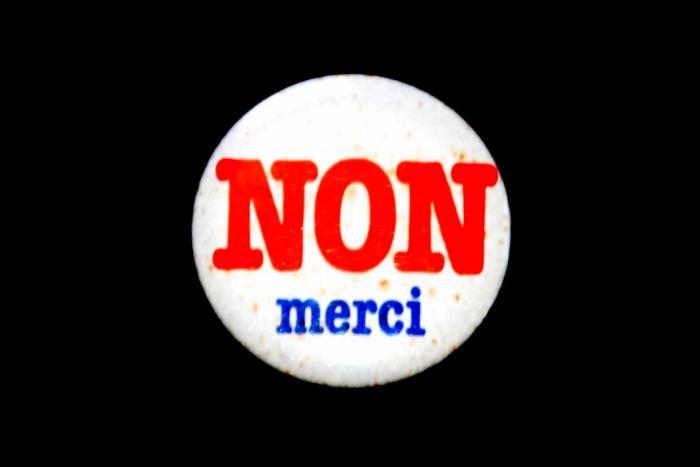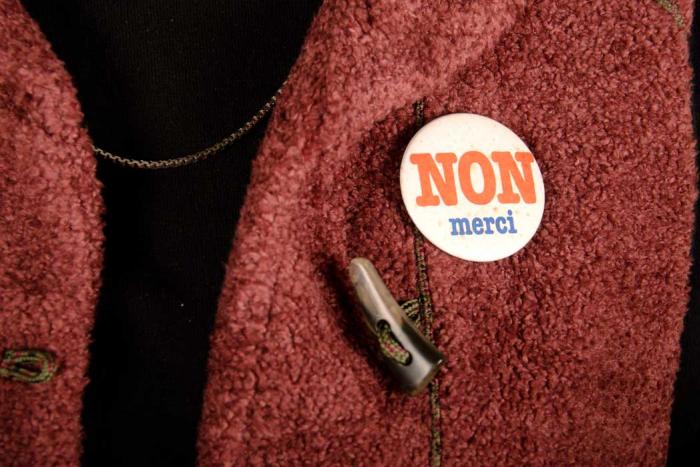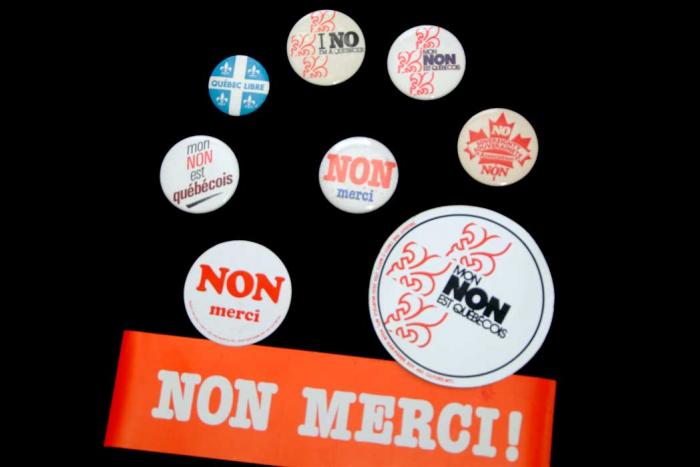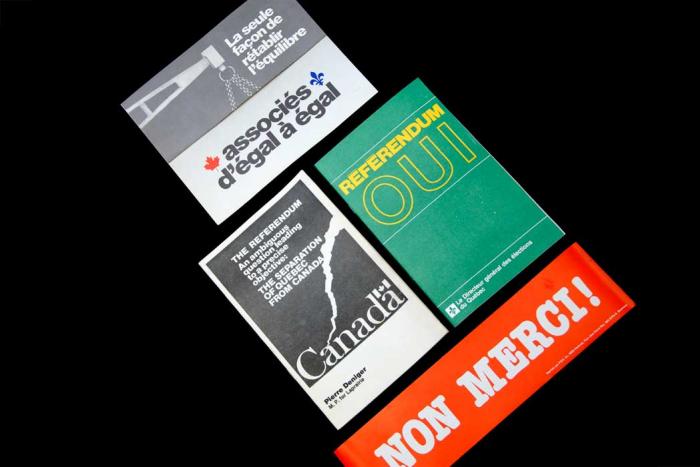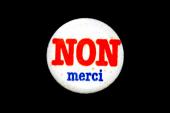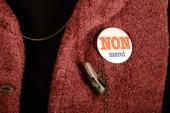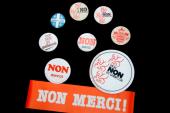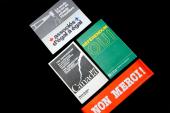NON MERCI Button
Organization: Quebec Anglophone Heritage Network
Address: Suite 400-257 Queen Street, Sherbrooke, QC J1M 1K7
Coordinates: www.qahn.org
Region: Laval
Contact: Matthew Farfan, execdir(a)qahn.org
Description: Metal campaign button from the first referendum on independence held May 20, 1980.
Year made: 1980
Made by: Unknown
Materials/Medium: Metal
Colours: White with red and blue letters
Provenance: Quebec
Size: 5.5 cm diameter
Photos: Rachel Garber
Voting No
Rod MacLeod
Anglophones have tended to find common cause in their opposition to Quebec independence. Most also do not support the independence-minded Parti Québécois, although many have done so over the years for strategic reasons without necessarily embracing the idea of Quebec as a separate nation. Quebec’s two sovereignty referendums have each brought most Anglophones together on the “No” side, and although it has not always been clear how much impact this voting block has had on the result, the campaigns have consistently raised questions of identity that are pertinent to Anglophones. The aftermath of the referendums has also had interesting consequences for Anglophones and their place within Quebec society.
It was the stated aim of the Parti Québécois (PQ) to hold a referendum on sovereignty once in power. Its electoral victory in November 1976 came about in no small part because of the personality and political achievements of its leader, former Liberal cabinet minister René Lévesque, and because the PQ promised to provide “good government” after a series of scandals had rocked the previous Liberal government of Robert Bourassa.
At the time of the election, independence was downplayed in favour of reforms to party political financing, insurance, and education, all of which were indeed effected during the party’s first term of office. By 1979, however, the government published a white paper on sovereignty, proposing a “New Deal” to be negotiated between Quebec and the rest of Canada as equal partners; this idea became known as “sovereignty association” and was marketed as a softer version of independence. Quebec voters were to decide in May 1980 whether to give the government the authority to negotiate this deal.
Federalists campaigned for a “No” vote, many of them Anglophones; many of these were members of newly-formed lobby groups such as the Positive Action Committee, which opposed the PQ’s language legislation. In March 1980, the return to power at the federal level of Pierre Trudeau with a promise to establish his own constitutional deal for Canada did much to reassure many Francophones in Quebec that a Yes vote was not the only way to achieve dignity for the province. In the end, the No side won the referendum with nearly 60% of the vote.
For some, the No victory was undermined by the re-election of the Lévesque government the following year; for others, even some Anglophones, a second term meant more good government, now that the annoying matter of sovereignty was out of the way. Having failed to obtain sovereignty through a referendum, the PQ was not about to sign on to Trudeau’s constitutional deal, leading to a political impasse. In 1987, in an attempt to resolve the issue, the provincial premiers drafted the Meech Lake Accord (named after the spot in the Gatineau Valley where it was negotiated). Providing it were ratified by all ten provinces before June 1990, the Accord would devolve many powers onto Quebec and grant it the status of a “distinct society” within Confederation.
Robert Bourassa, who had returned as Quebec premier after the PQ’s defeat in 1985, was enthusiastic about the accord, but other provinces were not so sure, fearing that the word “distinct” would mean that Quebec was somehow better than the rest. Many Quebec Anglophones were also concerned about this perception, notably Alliance Quebec, an organization formed out of the Positive Action Committee, and others in the wake of the referendum. In the 1989 provincial election, four Anglophones were elected as members of the new Equality Party, which promised to be a voice for Quebec Anglophones who felt their votes were taken for granted by the Liberal Party. Two years later, the Meech Accord died, failing to obtain the approval of all the provinces before the deadline. Bourassa voiced his dismay, but the new PQ leader Jacques Parizeau was angrier, and was swept to power in the 1994 provincial elections.
Parizeau wasted no time calling a second referendum on independence. This time the question was clearer: would voters enable the government to declare sovereignty, after making one last offer to arrange a partnership with Canada? Fed up with constitutional battles, Quebec voters seemed much keener than 15 years earlier to give independence a chance; pollsters predicted a Yes victory by a considerable margin.
Much of the Yes campaign was aimed at undecided voters, including “Allophones” (people of neither French nor English background), who it was hoped were now better integrated in the majority culture than earlier generations had been.
The No side seemed disorganized at first, and then anxious federalists began to plan a rally to be held in downtown Montreal on October 27, 1995, a few days before the referendum. Over 100,000 people gathered, some of them brought in by bus from other parts of Canada, which many on the Yes side thought unfair, even illegal.
Nevertheless, the political mood seemed to be swaying slightly away from a clear Yes victory, and it was the Yes side’s turn to feel anxious. The fact that over 86,000 referendum ballots were rejected, often for highly questionable reasons, in ridings expected to vote No heavily, may or may not have been a coincidence; in Chomedy in Laval, it was discovered that 1 in 9 ballots were rejected, a statistic that prompted the local Liberal MNA, Thomas Mulcair, to declare that sabotage had been deliberate.
In the end, the No side won with 50.58% of the vote. Parizeau resigned as premier at once, causing controversy in his farewell address by blaming the No victory on “money and the ethnic vote” – a veiled reference both to the financial resources (always associated with Anglophones) marshaled to defeat independence and to the Allophones who did not, after all, identify with a sovereign Quebec.
Such a tight margin of victory did suggest that Anglophones may have played a decisive role in achieving it. Parizeau’s successor as PQ premier, Lucien Bouchard, took some pains to reach out to Anglophone groups and reverse the assumption that English speakers were not truly a part of Quebec society.
In the wake of the 1995 referendum, Alliance Quebec would turn more strident in its demands for Anglophone rights, but many other organizations emerged – in health, welfare, the arts, heritage, and education – to advance the interests of Quebec Anglophones while conceding a “Yes” to the idea that the province should express itself publicly in French.
Sources
Garth Stevenson, Community Besieged: The Anglophone Minority and the Politics of Quebec, Montreal, 1999.
To Learn More
Ray Argyle, Turning Points: The Campaigns That Changed Canada - 2011 and Before, 2011.
Robert A. Young, The Secession of Quebec and the Future of Canada, 1995.
Robert A. Young, The Struggle for Quebec, 1999.
Author
Rod MacLeod is a Quebec social historian specializing in the history of Montreal’s Anglo-Protestant community and its institutions. He is co-author of A Meeting of the People: School Boards and Protestant Communities in Quebec, 1801-1998 (McGill-Queen’s Press, 2004); “The Road to Terrace Bank: Land Capitalisation, Public Space, and the Redpath Family Home, 1837-1861” (Journal of the Canadian Historical Association, 2003); “Little Fists for Social Justice: Anti-Semitism, Community, and Montreal’s Aberdeen School” (Labour/Le Travail, Fall 2012). He is the current editor of the Quebec Heritage News.


